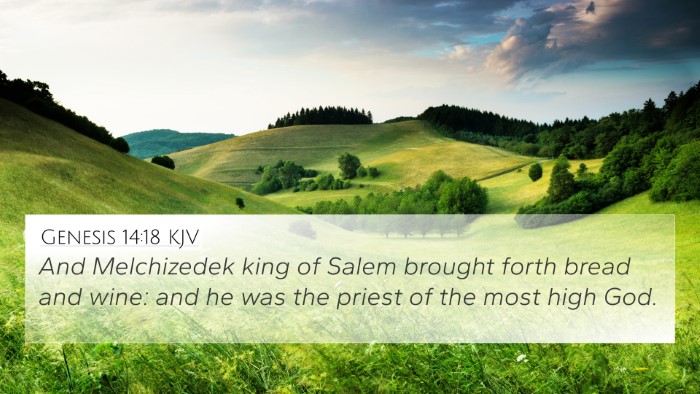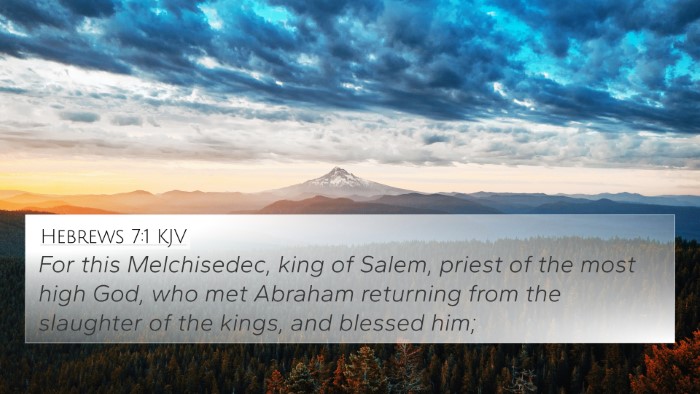Understanding 2 Samuel 5:6
Bible Verse: 2 Samuel 5:6 - "And the king and his men went to Jerusalem unto the Jebusites, the inhabitants of the land: which spake unto David, saying, Except thou take away the blind and the lame, thou shalt not come in hither: thinking, David cannot come in hither."
Interpretation and Summary
This verse marks a significant event in David's reign as he seeks to establish Jerusalem as the capital of his kingdom. The Jebusites, confident in their fortified city, believe they are immune to David’s advances. This attitude reflects on the challenges David faced in unifying Israel and overcoming opposition.
Commentary Insights
- Matthew Henry: Henry emphasizes the audacity of the Jebusites, who mock Samuel by highlighting their defenses. Their statement about the blind and lame metaphorically represents the spiritual blindness of those who oppose God's anointed.
- Albert Barnes: Barnes draws attention to the underestimation of David and his men. The Jebusites' overconfidence serves as a reminder of the futility of opposing God's plans.
- Adam Clarke: Clarke notes the historical significance of Jerusalem as a stronghold and its eventual capture by David, marking not just a military victory but a pivotal change in the political landscape of Israel.
Key Themes
- Divine Appointment: David's rise to power signifies God's choice, and the verse illustrates the beginning of his divine mandate to unite Israel.
- Opposition and Skepticism: The Jebusites' mockery reflects human skepticism against the divine purpose, showcasing how confidence in worldly strength often leads to pride and defeat.
- Spiritual Insight: The mention of blindness and lameness signifies the spiritual condition of those who reject God's chosen leaders.
Cross-References
This verse can be linked with several other passages that deepen its understanding and provide a richer context:
- 1 Chronicles 11:4-9: This passage recounts the capture of Jerusalem by David, confirming the historical account.
- 2 Samuel 1:1: Reflects on David's journey to kingship, showcasing God’s providential timing.
- Psalm 51:17: Speaks to the humility necessary in the face of opposition and God’s acceptance of a contrite spirit.
- Psalm 78:67-72: Discusses God's selection of David as a shepherd for His people, linking divine appointment with leadership.
- Matthew 21:9: Refers to Jesus, highlighting the continuity of Davidic kingship and the acknowledgment of Jesus as the King.
- Hebrews 7:14: Connects the priesthood of Jesus with the lineage of David, affirming the messianic prophecies.
- 1 Samuel 17:45: Displays David's faith in God's deliverance against Goliath, aligning with his confidence against the Jebusites.
Conclusion
In conclusion, 2 Samuel 5:6 is rich in historical and theological significance, showcasing David’s faith and the challenges he faced. By utilizing tools for cross-referencing biblical texts, believers can uncover deep connections within scripture, enhancing their understanding of God's overarching narrative.
Tools for Cross-Referencing
For those looking to delve deeper into scriptural analysis, here are useful tools and methods:
- Bible concordance for word searches.
- Comprehensive Bible cross-reference guides.
- Online Bible reference resources.
- Techniques for identifying connections between Old and New Testament themes.
- Methods for conducting a detailed cross-reference study among the Gospels.
Further Exploration
For those keen to explore how various verses interconnect, consider examining:
- How to find cross-references in the Bible effectively.
- Identifying the thematic connections between the Prophets and New Testament teachings.
- Links between similar Bible verses and exploring their similarities.
By engaging with scripture through cross-referencing techniques, believers can enhance their understanding of God's Word and its relevance to their lives today.












